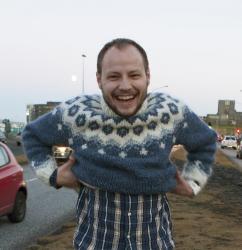Although I’d like to think that every month in Iceland is National Poetry Month, the reality is that Iceland doesn’t have an official National Poetry Month. In lieu of this, we’re going to take a break from recapping the dusty, repetitive Sagas in honor of April being National Poetry Month in the United States and Canada because why the hell not? This month, I’m going to recap the crown jewel of Icelandic literature and Norse mythology known mysteriously as the Edda.
I mean, if you can drink a discounted Guinness on St Patrick’s Day to celebrate Irish culture even though you live in Iceland, you can read at least one goddamn poem in all of April to celebrate poetry even though it’s National Poetry Month in another country. Or if not, you can just read this article about poetry with unnecessary swearing. I know you love that shit.
Dragons and Drag Queens
The Edda is the name given to a collection of poems, most of which only exist in a single manuscript from around 1270. No one really knows where the name Edda comes from, but it was first used by that fat dude with the Farrah Fawcett beard on the 1.000 krónur bill. He gave away arguably the most precious artifact in all Icelandic history to the smelly, witch-hating king of Denmark in 1643. It wouldn’t be returned for over three hundred years. That wasn’t very punk rock of him but it got the sellout’s dumb face on some money forever, so capitalism or whatever. Congratufuckinglations, Brynjólfur. You made it.
Anyway, don’t let anyone sell you some dumb shit about the poems all being connected because the Edda is more like a sort of anthology of several smaller collections of poems centering on different themes and characters. They range from Peter Jackson-status apocalyptic fantasy to pagan dating advice to dumbshit slapstick comedies to travel guides to stories of violence against women to guessing games. For anyone looking for a killer costume idea for Drag-Súgur, there’s even a poem where Þórr and Loki have to dress in drag as bride and bridesmaid to recover Þórr’s stolen hammer from a giants’ wedding. Bring the whole family because there’s something for everyone.
What the Vulva Says
The most famous of them all is Völuspá, the Prophecy of the Seeress. In this one, an Icelandic fortune-teller known as a völva (why yes it does sound like the English word vulva, making any Norse literature class a lot of fun) tells Óðinn some stuff. She tells how the world came from dwarves, then she lists dwarves’ names for several pages (many of the names were later used in ’The Hobbit’—including Gandalf). She’s just really into dwarves right now.
Then she tells him how his sissy, pretty-boy son Baldur is gonna get killed by mistletoe and then all the gods will get killed by giants and a sea monster and a wolf in the apocalypse known as Ragnarök. There’s fire and blood and all kinds of dope shit just waiting to be turned into a narratively idiotic blockbuster film whose only redeeming quality is amazing special effects. I’d totally pay one and a half Bryjólfurs to see that.
Racism and Another Vulva
While the first half revolves around the gods of Norse mythology, the poems in the second half of the Edda all tell the story of Sigurður, Brynhildur, and Guðrún, which was turned into one of the weirdest and best sagas, Völsunga Saga, which I’ve already recapped. There are also a few poems considered “eddic” by their meters and content even though they aren’t included in the main manuscript.
The weirdest of these is the super white supremacist Rigsþula, where some guy travels around having threesomes with couples of various socioeconomic classes, whose women then beget the different races. The poor farmers have black children with names like “slave” and “servant,” the middle-class people have ginger children with names like “smith” and “shepherd,” and of course the rich couple beget blonde children with names like “earl” and “nobleman.” Yep. I’ll just leave that there.
On a happier note, there also exists a poem called Hyndluljóð in which another, even sassier völva calls Frigg, queen mother of the gods, a goat-slut, and then sets her on fire. I always prefer a sassy völva, don’t you?
Morals of the story:
1. Read a fucking poem. It can be a medieval Icelandic one or one by Anne Carson or anyone in between.
2. Read another one.
3. See how great they are? Shut up, I know.
Buy subscriptions, t-shirts and more from our shop right here!
















